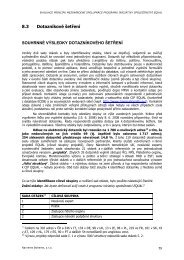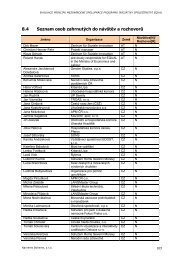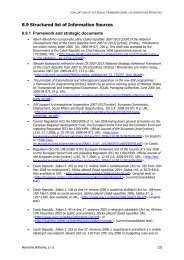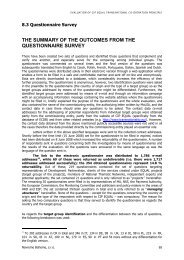EQUAL - Final report - eng - navreme
EQUAL - Final report - eng - navreme
EQUAL - Final report - eng - navreme
Create successful ePaper yourself
Turn your PDF publications into a flip-book with our unique Google optimized e-Paper software.
EVALUATION OF CIP <strong>EQUAL</strong> TRANSNATIONAL CO-OPERATION PRINCIPLE<br />
It is possible to follow several basic cooperation tools, which are characteristic for different project<br />
types. The projects, which are based above all on conferences and presentations of work of the<br />
national partners in transnational context, are organised and managed in a different way than the<br />
projects based on workshops, short-term attachments or intensive work on preparation of a particular<br />
product (joint research, development of know-how, of new tools, joint innovation – the management<br />
is tighter, the transnational cooperation is not disintegrated to such extent to partial tasks within the<br />
question of the individual partners).<br />
Each of the mentioned types of cooperation brings different effects. It resulted from the results of the<br />
questionnaire investigation that the recipients had classified in particular the transfer of practices and<br />
know-how, the development of the partnership, joint development of methods and new tools and the<br />
planning and management of the project itself as the key activities for the project’s success. However,<br />
the complex results of the evaluation have proved that the activities relating to the transnational<br />
cooperation used most often in CZ do not have to belong necessarily to the most suitable ones.<br />
The factors of success from the point of view of the project implementation itself may be identified<br />
according to the individual tools of implementation and according to the actors, at whom they are<br />
aimed. While for example international conferences have as their objective to reach wider public<br />
across the target groups and the surrounding of the problem, the professional work meetings work<br />
with the internal sources of the project. Sharing the practice involves the local actors, joint<br />
development of policies rather the independent experts.<br />
From the simplified questionnaire investigation and the evaluation visits and interviews a simplified<br />
classification of the activities and the tools of cooperation used according to the reached target groups<br />
has resulted:<br />
a) conferences and similar events reaching with its significance the professional public, people<br />
from practice;<br />
b) work meetings and expert teams – intended for particular work and narrowly focused, e.g.<br />
on development of some product, only the experts concerned partake or they invite the<br />
representatives of grantors, clients;<br />
c) work meetings comprising sharing of the practice as an integral part – practicians, target<br />
groups partake, some short-term attachments, some types of visits and the like belong here.;<br />
d) individual contacts – personal or mediated;<br />
e) other (research, short term attachments of study type, etc.).<br />
This shortened classification may serve as a good guidance for managerial decision-making bound to<br />
the transnational cooperation, it means decision-making on the extent of its formalisation, forms of<br />
contact, division of responsibility, setting communication, harmonising / balancing of the content and<br />
chosen forms, etc.<br />
In the sense of the factors of success, the individual identified activities may be qualified according to<br />
the participating target groups as follows:<br />
• Transfer of practices, tools and know-how: It may relate both to direct practicians<br />
(grantors) and the expert employees; the factors of success are good identification of terms<br />
and conditions, under which different target groups may be involved in such process, and<br />
suitably selected particular procedures that are transferable, comparable, as the case may be<br />
at least communicable among the participating parties.<br />
• Joint development of new tools and methods: Activity focused on expert teams – the<br />
factors of success are functionality and equilibrium of the team and agreeing, shared<br />
objectives; all issues concerning the framework for the given development need to be solved<br />
in advance, namely including an accord on the starting points and values.<br />
• Joint experiments in the area of innovative approaches: An innovative method that<br />
presupposes involvement of experts, intermediate bodies (grantors, consultancy bodies, etc.);<br />
the factors of success are good composition of the team, enough stimuli, ability to react to<br />
current situations and local environment.<br />
• Joint research: Expert activity, in which it may be sometimes difficult to determine how the<br />
transnational team differentiates from another team, therefore the factor of success within<br />
Navreme Boheme, s.r.o. 35











